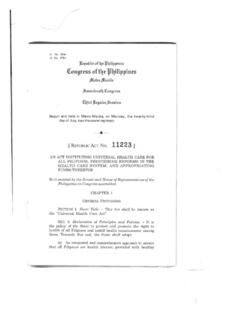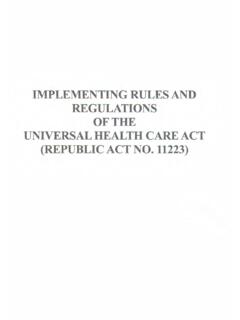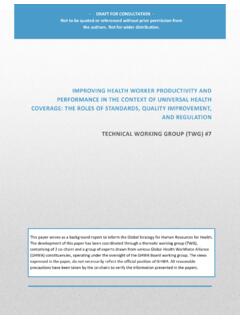Transcription of UNIVERSAL HEALTH COVERAGE AND HEALTH OUTCOMES
1 1 UNIVERSAL HEALTH COVERAGE AND HEALTH OUTCOMES Final Report Paris, 22 July 2016 Contacts 2 TABLE OF CONTENTS UNIVERSAL HEALTH COVERAGE AND HEALTH OUTCOMES .. 1 1. Introduction .. 3 2. UNIVERSAL HEALTH COVERAGE improves HEALTH .. 4 Life expectancy has a positive correlation with core components of HEALTH COVERAGE , as well as overall healthcare resources .. 4 Greater spending on HEALTH has made a major contribution to better HEALTH OUTCOMES , but the wider determinants of HEALTH are also important.
2 6 Countries experiences demonstrate the positive impact of UNIVERSAL HEALTH COVERAGE on HEALTH 7 3. UNIVERSAL HEALTH COVERAGE is affordable for middle-income countries, but requires strong political commitment .. 8 Without active government intervention, the transition to UNIVERSAL HEALTH COVERAGE will be lengthy8 UNIVERSAL HEALTH COVERAGE is achievable for middle-income countries; low-income countries can still make substantive progress .. 11 Channelling out-of-pocket spending into mandatory pre-payment pools is the critical first step.
3 14 4. UNIVERSAL HEALTH COVERAGE is needed all the more as countries age .. 15 A number of OECD countries started to experience ageing populations when they achieved UHC15 Many emerging economies have rapidly ageing populations, making UHC a pressing goal .. 16 5. UNIVERSAL HEALTH COVERAGE needs to be achieved with the right policies .. 19 UNIVERSAL population COVERAGE and adequate financial protection are cornerstones of UHC, so critical assessment of which HEALTH services to cover is essential .. 19 Build in financial sustainability from the start.
4 24 Be innovative with service delivery, moving away from cure-centred models .. 27 6. Conclusions .. 29 REFERENCES .. 30 Annex. Country case studies provide useful lessons on how to achieve and sustain UNIVERSAL HEALTH COVERAGE .. 35 3 1. Introduction1 1. Japan has been leading efforts to promote UNIVERSAL HEALTH COVERAGE (UHC) worldwide. The goal behind these efforts is to improve HEALTH OUTCOMES by making access to high-quality HEALTH services more affordable and equitably distributed.
5 2. UHC means that people have access to the HEALTH care services that they need without undue financial hardship. UHC is commonly understood to consist of three interrelated components: the population covered, the range of services made available; and the extent of financial protection from the costs of HEALTH services (Stuckler, Feigl, Basu, & McKee, 2010; WHO, 2010). 3. Nearly all OECD countries have achieved UHC, and their experience should be the main source of evidence as to why UHC is desirable, when it should be introduced, and how it should be achieved.
6 Better understanding of the links between life expectancy and UHC and of the links between COVERAGE arrangements and gaps between life expectancy and healthy life expectancy would contribute to efforts to monitor progress towards the achievement of Goal 3 of the Sustainable Development goals. 4. This report addresses four key questions. First, to what extent has the achievement of UHC in OECD countries contributed to improved population HEALTH OUTCOMES ? Second, is UHC affordable for low- and middle-income countries?
7 Third, what are the implications of population ageing for the goal of UHC? Fourth, what are the key policies low- and middle-income countries should consider as they approach UHC. These questions are addressed primarily through new quantitative analyses and reviews of policies from both OECD and non-OECD countries. In-depth country case studies provide further lessons of how selected OECD countries have achieved and sustained UHC. 5. Based on the findings of this report, a number of key recommendations are worth highlighting: UHC improves HEALTH OUTCOMES and provides financial protection against impoverishing HEALTH care cost; all countries should therefore set to achieve UHC; UHC is affordable for a large number of middle-income countries; reforms to create fiscal space and convert out-of-pocket payments into pooled funding for HEALTH are within reach.
8 Rapid population ageing worldwide means that efforts to achieve UHC cannot be delayed; countries must act even faster than OECD counties did when they first introduced UHC; The experience of OECD countries shows that a successful UHC strategy requires the right set of policies. Covering the whole population is non-negotiable, and depth of financial COVERAGE should be prioritised over breath of service COVERAGE ; 1 UHC in ageing societies is one of the themes at a G7 HEALTH summit in Kobe, in September 2016.
9 This report on the review of countries on UHC is commissioned by the Japanese Ministry of HEALTH , Labour and Welfare as an input for the G7 meeting. 4 Fiscal space should be secured without an over-reliance on payroll taxes, as working age cohorts will dwindle; Skip a generation of service delivery reforms, by investing early on in HEALTH promotion and disease prevention; strengthening primary care; and making better use of data through advanced information systems. 2. UNIVERSAL HEALTH COVERAGE improves HEALTH Life expectancy has a positive correlation with core components of HEALTH COVERAGE , as well as overall healthcare resources 6.
10 That UHC improves HEALTH OUTCOMES makes intuitive sense it helps ensure everyone in a society can use HEALTH services when they need them. But looking at the data gives a more precise idea of the impact of UHC on HEALTH . 7. For a selection of OECD countries and emerging economies (Brazil, China, Colombia, Costa Rica, India, Indonesia and Russia), a clear positive association exists between life expectancy at birth and UHC indicators reflecting the three core components of HEALTH COVERAGE the population covered by a core set of services (population COVERAGE ); out-of-pocket payments (financial COVERAGE ).

















